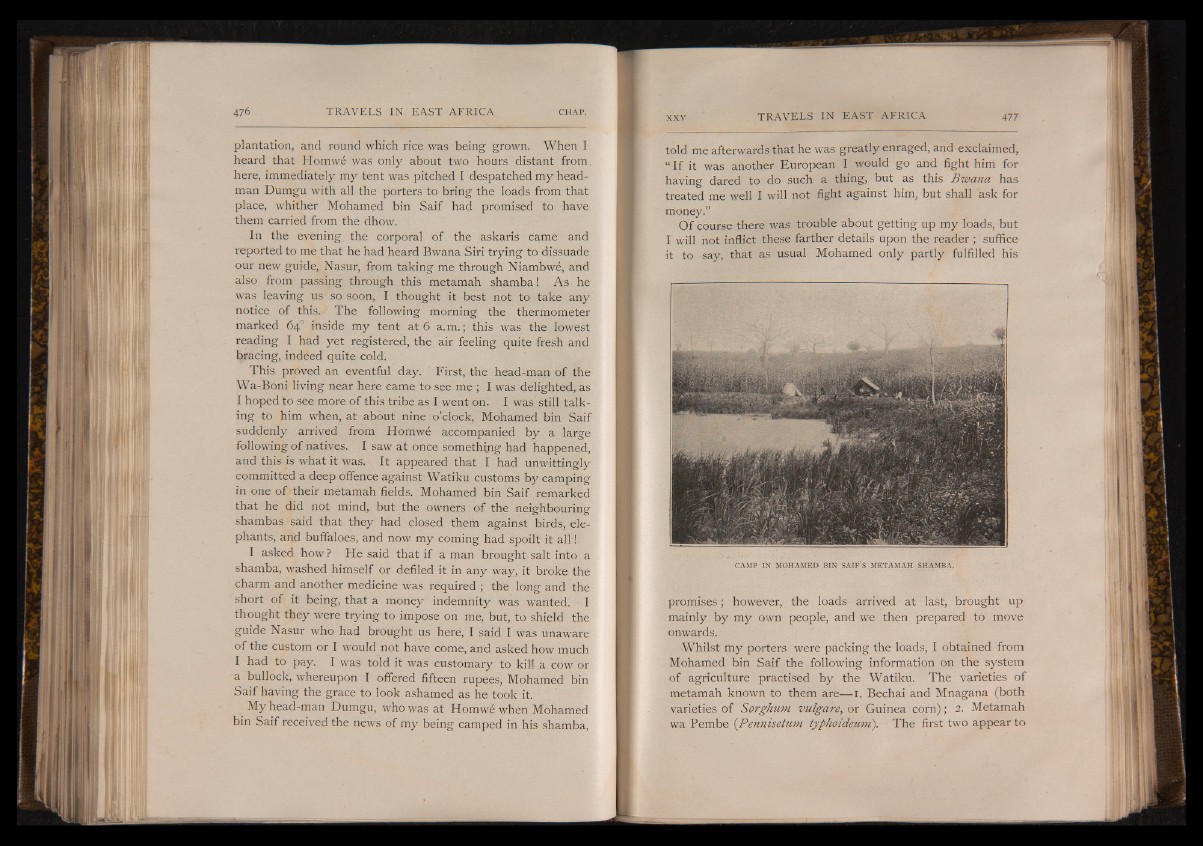
plantation, and round which rice was being grown. When I
heard that Homwé was only about two hours distant from,
here, immediately my tent was pitched I despatched my headman
Dumgu with all the porters to bring the loads from that
place, whither Mohamed bin Saif had promised to have
them carried from the dhow.
In the evening the corporal of the askaris came and
reported to me that he had heard Bwana Siri trying to dissuade
our new guide, Nasur, from taking me through Niambwé, and
also from passing through this metamah shamba! As he
was leaving us so soon, I thought it best not to take any
notice of this. The following morning the thermometer
marked 64o inside my tent a tó a.m.; this was the lowest
reading I had yet registered, the air feeling quite fresh and
bracing, indeed quite cold.
This proved an eventful day. First, the head-man of the
Wa-Boni living near here came to see me ; I was delighted, as
I hoped to see more of this tribe as I went on. I was still talking
to him when, at about nine o’clock, Mohamed bin Saif
suddenly arrived from Homwé accompanied by a large
following of natives. I saw at once something had happened,
and this is what it was. It appeared that I had unwittingly
committed a deep offence against Watiku customs by camping
in one of their metamah fields. Mohamed bin Saif remarked
that he did not mind, but the owners of the neigoh bourineor
shambas said that they had closed them against birds, elephants,
and buffaloes, and now my coming had spoilt it a ll!
I asked how ? He said that if a man brought salt into a
shamba, washed himself or defiled it in any way, it broke the
charm and another medicine was required ; the long and the
short of it being, that a money indemnity was wanted. I
thought they were trying to impose on me, but, to shield the
guide Nasur who had brought us here, I said I was unaware
of the custom or I would not have come, and asked how much
I had to pay. I was told it was customary to kill a cow or
a bullock, whereupon I offered fifteen rupees, Mohamed bin
Saif having the grace to look ashamed as he took it.
My head-man Dumgu, who was at Homwé when Mohamed
bin Saif received the news of my being camped in his shamba,
told me afterwards that he was greatly enraged, and exclaimed,
“ If it was another European I would go and fight him for
having dared to do such a thing, but as this Bwuna. has
treated me well I will not fight against him, but shall ask for
money.”
Of course there was trouble about getting up my loads, but
I will not inflict these farther details upon the reader ; suffice
it to say, that as usual Mohamed only partly fulfilled his
CAMP IN MOHAMED BIN SAIF'S METAMAH SHAMBA.
promises; however, the loads arrived at last, brought up
mainly by my own people, and we then prepared to move
onwards.
Whilst my porters were packing the loads, I obtained from
Mohamed bin Saif the following information on the system
of agriculture practised by the Watiku, The varieties of
metamah known to them are— 1. Bechai and Mnagana (both
varieties of Sorghum vulgare, or Guinea corn); 2. Metamah
wa Pembe (Pennisetum typhoideum). The first two appear to